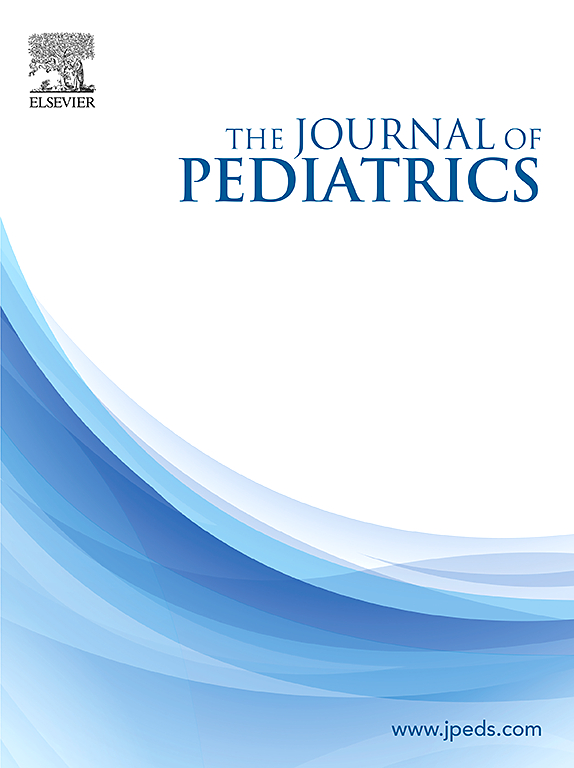Inhaled Nitric Oxide Treatment of Early Pulmonary Hypertension to Reduce the Risk of Death or Bronchopulmonary Dysplasia in Infants Born Extremely Preterm: A Masked Randomized Controlled Trial
IF 3.9
2区 医学
Q1 PEDIATRICS
引用次数: 0
Abstract
Objective
To determine whether inhaled nitric oxide (iNO) treatment of early pulmonary hypertension (PH) would decrease the risk of death or bronchopulmonary dysplasia (BPD) among infants born extremely preterm.
Study design
This was a single-center, masked, randomized controlled trial involving infants born at ≤29 weeks’ gestation and requiring positive pressure ventilation. Exclusion criteria included infants of COVID-19 positive mothers, large patent ductus arteriosus with left to right shunting, left ventricle dysfunction (ejection fraction <40%), significant congenital anomalies/genetic disorders, or iNO treatment by clinicians prior to the study echocardiogram. Initial echocardiogram was performed at 72 ± 24 hours of life to randomize infants with early PH into 2 study arms (iNO vs placebo). Serial echocardiograms were performed every 24-48 hours, up to 14 days of life. Treatment was weaned until PH resolved (responders) or if no improvement was documented ≥72-hours (nonresponders). Primary outcome was death or BPD at 36-weeks postmenstrual age.
Results
From July 2019 to October 2023, 683 eligible infants were admitted. We excluded 88 infants; 413 mothers declined consent or were not approached. iNO treatment was clinically started for 51 infants due to hypoxic respiratory failure. Screening echocardiograms were completed for 180 infants; of these, 32 infants with early PH were randomized to iNO or placebo groups. After a planned interim analysis, termination of the trial was recommended by the Data Safety Monitoring Committee because of futility.
Conclusion
iNO treatment does not reduce the risk of BPD or death among extremely preterm infants with echocardiographic evidence of early pulmonary hypertension without hypoxic respiratory failure.
吸入一氧化氮治疗早期肺动脉高压以降低极早产儿死亡或支气管肺发育不良的风险:一项随机对照试验
目的:确定吸入一氧化氮(iNO)治疗早期肺动脉高压(PH)是否会降低极早产儿死亡或支气管肺发育不良(BPD)的风险。研究设计:这是一项单中心、随机对照试验,涉及出生72小时的婴儿(无反应)。主要结局是经后36周死亡或BPD。结果:2019年7月至2023年10月,683名符合条件的婴儿入院。我们排除了88名婴儿;413名母亲拒绝同意或没有联系。51例新生儿因缺氧性呼吸衰竭开始临床治疗。完成180例婴儿超声心动图筛查;其中,32名早期PH患儿被随机分为iNO组和安慰剂组。经过计划的中期分析,由于无效,数据安全监测委员会建议终止试验。结论在超声心动图显示早期肺动脉高压且无缺氧呼吸衰竭的极早产儿中,iNO治疗并不能降低BPD或死亡的风险。
本文章由计算机程序翻译,如有差异,请以英文原文为准。
求助全文
约1分钟内获得全文
求助全文
来源期刊

Journal of Pediatrics
医学-小儿科
CiteScore
6.00
自引率
2.00%
发文量
696
审稿时长
31 days
期刊介绍:
The Journal of Pediatrics is an international peer-reviewed journal that advances pediatric research and serves as a practical guide for pediatricians who manage health and diagnose and treat disorders in infants, children, and adolescents. The Journal publishes original work based on standards of excellence and expert review. The Journal seeks to publish high quality original articles that are immediately applicable to practice (basic science, translational research, evidence-based medicine), brief clinical and laboratory case reports, medical progress, expert commentary, grand rounds, insightful editorials, “classic” physical examinations, and novel insights into clinical and academic pediatric medicine related to every aspect of child health. Published monthly since 1932, The Journal of Pediatrics continues to promote the latest developments in pediatric medicine, child health, policy, and advocacy.
Topics covered in The Journal of Pediatrics include, but are not limited to:
General Pediatrics
Pediatric Subspecialties
Adolescent Medicine
Allergy and Immunology
Cardiology
Critical Care Medicine
Developmental-Behavioral Medicine
Endocrinology
Gastroenterology
Hematology-Oncology
Infectious Diseases
Neonatal-Perinatal Medicine
Nephrology
Neurology
Emergency Medicine
Pulmonology
Rheumatology
Genetics
Ethics
Health Service Research
Pediatric Hospitalist Medicine.
 求助内容:
求助内容: 应助结果提醒方式:
应助结果提醒方式:


